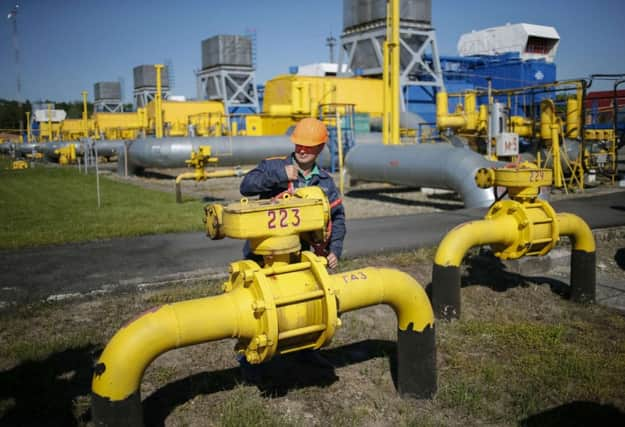Tension as Russia shuts off gas line to Ukraine


The decision to cut supplies will add to the tensions between Ukraine and Russia, as conflict continues to rage in eastern Ukraine between Ukrainian government forces and allegedly Moscow-backed separatists.
Gazprom, Russia’s state-owned energy company, decided to cut off the supply lines after EU-brokered talks between it, Ukrainian president Petro Poroshenko, and Naftogaz, Ukraine’s energy company, broke down with no agreement.
Advertisement
Hide AdAdvertisement
Hide AdGazprom said that from now it would only provide gas only if Ukraine pays up front.
In a statement issued yesterday, the firm said: “Today, from 10:00 Moscow time, Gazprom, according to the existing contract, moved Naftogaz to prepayment for gas supplies.
“From today, the Ukrainian company will receive Russian natural gas only in the amounts it has paid for.”
Yuri Prodan, Ukraine’s energy minister, stated that “gas supplies to Ukraine have been reduced to zero”.
The complete loss of gas imports should not affect general life in Ukraine in the short term – summer means that demand is low and Ukraine, long aware of its energy vulnerability, has stockpiled enough gas reserves to last until December.
But although Moscow has pledged that supplies to the West will not be affected, the shut off to Ukraine has raised the prospect of a repeat of the disruption seen in 2006 and 2009. Both times thousands of homes in south-eastern European states heavily dependent on Russian energy imports went cold as gas supplies dried up.
Alexey Miller, Gazprom’s chief executive, warned the EU might experience problems again if Ukraine tries to siphon off supplies bound for the West.
“Regarding transit risks, they exist and they are not insignificant,” he said.
Advertisement
Hide AdAdvertisement
Hide AdGazprom said it had no choice but to cut supplies because of Naftogaz’s “systematic failure to pay” its bills. The Russian company wants the £2.6 billion it says the Ukrainian firm owes it for past supplies. According to the EU, Gazprom turned down an offer of an immediate payment of £588 million, instead demanding £853m with monthly payments on top of that.
The two sides also clashed over the price of gas, with the Ukrainians saying the Russians were asking too much.
However, Ukraine has claimed Gazprom’s move has little to do with business and much more to do with politics.
Russia still regards the current Ukrainian government as illegitimate, while Kiev has accused Moscow of fomenting the conflict in eastern Ukraine that over the weekend claimed the lives of 49 Ukrainian military personnel, who died when their transport aircraft was shot down by rebels.
Kiev has claimed the gas cut is aimed at undermining the country’s sovereignty.
Arseniy Yatseniuk, Ukraine’s prime minister, said: “It is not about gas. It is a general Russian plan to destroy Ukraine. It is yet another step against the Ukrainian state and against Ukrainian independence.”
With the two sides seemingly unwilling to compromise, Gazprom said the chances of another meeting “are slim”.
A continued impasse could see the international gas price get the jitters, and add weight to growing EU calls for Europe to develop a collective energy policy, and move away from dependency on Russian gas.
Advertisement
Hide AdAdvertisement
Hide Ad“Everyone is a loser in this stalemate,” said Professor Michael Bradshaw, a global energy expert at Warwick Business School.
“It is doing Russia reputational damage and the EU is stiffening its resolve to reduce its reliance on Russian gas, but many European companies have contracts into the 2020s with Gazprom.”